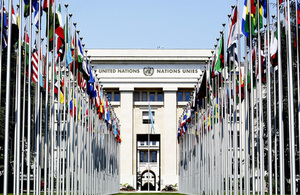Human Rights Council 38: Girls' Education
This joint statement was delivered at the 38th Session of the Human Rights Council on behalf of 134 States, during the discussion held on 25 June 2018.

The Human Rights Council takes place at the Palais des Nations in Geneva
I have the honour to deliver this joint statement on behalf of 134 members and observers.
Education is a right for all, enshrined in human rights treaties and is a core part of the Sustainable Development Goals. This Council has also long known that education is a multiplier right.
Yet 264 million children are out of school. Of those who do attend primary school, over half (56%) do not master the basic numeracy and literacy skills needed to progress to secondary school.
-
15 million girls will never have the opportunity to read and write in school, compared to 10 million boys
-
Nearly two-thirds of the world’s illiterate adults are women
This Council has considered some of the barriers that girls face in accessing quality education, including poverty, rural location, social norms and attitudes, the impact of crisis and conflict, sexual and gender based violence, child, early and forced marriage, and early pregnancy to name but a few.
This Council has passed resolutions urging states to “strengthen and intensify their efforts to take deliberate, concrete and targeted steps to fully realize the equal enjoyment of the right to education by every girl”. It has called upon States to “place enhanced emphasis on quality education for girls.”
We have agreed, collectively, to ensure access to quality early childhood development, safe primary and secondary education as well as technical, vocational and tertiary education. We are united in a shared vision of a world where all children complete free primary and secondary education with the skills, knowledge and opportunities to lead a productive and fulfilling life.
We must leave no girl behind, and provide opportunity for at least 12 years of quality education for all girls and boys – for their own benefit and in the wider interests of their families and societies.
This will require a stronger collective effort – by states, international organisations, and civil society - to ensure that the next generation of girls are not condemned to lives of poverty, illiteracy and unfulfilled potential.
We commit to work together to make this vision a reality as a matter of urgency.